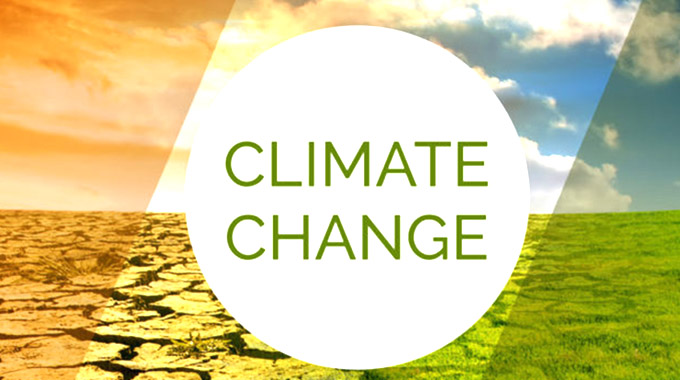2021: The year climate change came under spotlight

Sifelani Tsiko
Agric, Environment & Innovations Editor
In 2021, there was a lot of discussion in the media and in the political realm about the growing challenge of climate change and its impact in Africa and across the world.
Under the year under review, no other environmental issue garnered more attention globally than climate change and the associated debate over global warming.
This issue has been the topic of countless hearings over the past several years and this year it came under intense scrutiny and rigorous debate in Glasgow where the 26th United Nations Climate Change Conference of Parties (COP26) was held.
The list of calamities that come with continued global warming has hit Africa hardest despite the continent being the least polluter.
Africa incurred economic losses of up to US$5 billion due to weather-related disasters that have hit the continent and other parts of the world over the past five decades, says the World Meteorological Organisation.
According to the WMO Atlas of Mortality and Economic Losses from Weather, Climate and Water Extremes (1970-2019) released this week, Africa recorded 1 695 disasters that caused the loss of 731 747 lives and $5 billion in economic losses.
The continent accounts for 15 percent of weather, climate, and water-related disasters, 35 percent of associated deaths and one percent of economic losses reported globally.
Although disasters associated with floods were the most prevalent at 60 percent, droughts led to the highest number of deaths, accounting for 95 percent of all lives lost in the region, with most occurring in Ethiopia, Mozambique and Sudan.
The WMO report said over the past 50 years, disasters related to weather, climate or water hazards have become a regular occurrence, responsible for the deaths of at least 115 people on average daily, and causing US$202 million in economic losses every day.
All this shows that Africa, which bears the least responsibility for the world’s climate crisis faces the most severe consequences.
On the back of this, African nations at the COP26 climate summit criticised rich countries for failing to meet their promise of giving billions of dollars to help them cope with climate change.
It is sad that the world’s wealthiest nations — the G-20 — account for 80 percent of greenhouse gas emissions and yet Africa is suffering the worst effects of climate change.
Rich nations pledged in 2009 to give developing countries $100 billion a year to help them deal with climate change, but the target date was pushed back to 2023 at the beginning of the COP26 summit.
President Mnangagwa told delegates at the United Nations Climate Change Conference that climate change had increased the frequency of severe droughts and cyclone-induced floods with economic sanctions adversely affecting the implementation of programmes to mitigate the impact of climate risks on Zimbabweans.
“This, coupled with the economic sanctions imposed on us and the Covid-19, have had negative impacts on the people of my country,” he said.
“Notwithstanding that as a country we are ‘a net sink’, I am pleased to highlight that Zimbabwe has revised its Nationally Determined Contributions and committed to a conditional 40 percent per capita greenhouse gas emissions reduction target, by 2030.
“Comprehensive strategies are also being implemented towards mainstreaming climate change adaptation and resilience across all sectors of our economy.
“The removal of the illegal sanctions imposed on my country will undoubtedly enhance the timely achievement of our commitments.”
Democratic Republic of Congo President and chair of the African Union Felix Tshisekedi, said Africa could not overcome the challenges of climate change alone.
“As a continent that only contributes three percent of greenhouse gas emissions, Africa cannot be left on its own to manage their increasingly harmful effects,” he said.
Madagascar’s President Andry Rajoelina said of the famine currently ravaging his country:
“More than 1,3 million people are facing a food crisis. My countrymen are paying the price for a climate crisis that they did not create.”
A number of African leaders voiced their concern at the global climate change summit, calling on rich industrialised nations to honour their pledges to help Africa tackle climate change related problems.
African climate change campaigners and environmental activists all agree that the 2021 United Nations Climate Change Conference was a mixed bag for African and most other developing nations.
It was disappointing for many in Africa that world leaders failed to take the steps necessary to prevent the worst effects of climate change.
They said COP26 didn’t produce any commitments that could be characterised as immediate, rapid or large-scale.
Environmentalists and development experts from Africa all urged African leaders to continue to demand deeper reductions to carbon emissions and adequate financial support from developed countries at future COPs.
The campaigners and climate change experts identified five key areas that Africa needed to work on to tackle climate change:
◆ To better strengthen the continent’s response to climate change, African countries need to measure the scale of environmental change better, to understand what is happening. Increasingly erratic patterns of rainfall, devastating tropical storms, locust swarms outbreaks and food insecurity all needed to be mapped and understood.
African countries were urged to measure the rapid population growth, pressure on both natural and human resources, shortages of farmable land, urbanisation and growing competition between farmer and herder communities and other factors coming as a result of climate change.
◆ African countries were also called upon to continue to pile pressure on emitters of carbon to take faster action to slow and stop climate change.
Campaigners discouraged African countries from focusing simply on getting more money as they would still have to pay for climate change in terms of the consequences.
Climate change impacts stood to worsen existing social, economic and political tensions as well as violent conflict.
◆ African countries also needed to continue pressuring rich industrialised countries on money matters. Campaigners say of the US$100 billion per year pledge, confirmed in Paris, only a fraction has been delivered.
Few African governments have the financial or administrative resources to undertake the scale of mitigation and adaptation action necessary to manage the pressures created by climate change hence they need to press for more resources to tackle climate change.
◆ African governments were also urged to strengthen coordination mechanisms amongst themselves to tackle climate change.
Campaigners and experts expressed concern that too many leave it to the environment ministry and fail to mobilise all other departments to mainstream climate change into their action plans.
They say it is domestic political pressure on national governments more than international obligations or summits that will decide how far countries are willing to go to reduce greenhouse gas emissions.
◆ Target investment is another critical component for Africa.
Most African governments needed to invest more in energy transition, education to develop the skills needed for climate response and action to sustain biodiversity, forests and the natural environment by making it economically viable for the people who live there.
African countries were also urged to invest wherever they can in renewable energy.
Despite the criticism of the Glasgow conference, there were some few bright spots of the summit.
The world leaders’ Declaration on Forests and Land Use in which more than 100 leaders reaffirmed commitments to halt and reverse forest loss and land degradation by 2030 while delivering sustainable development and promoting an inclusive rural transformation, was a welcome outcome.
What perhaps will be important on this, is urgent implementation of the commitment.
The Declaration commits to halt and reverse forest loss and land degradation by 2030 and pledges $12 billion in public funds to protect and restore forests, alongside $7.2 billion of private investment.
“Forests provide ecosystem services that are critical to human, economic and social well-being, yet they continue to disappear at alarming rates.
“The commitment by over 100 world leaders to halt and reverse deforestation and land degradation by 2030 is welcome in that it acknowledges the important value of forests and other natural ecosystems,” said Fran Price, lead of the WWF Global Forest Practice.
“This should be followed by urgent implementation of those commitments and policies to address the drivers of deforestation and forest degradation, including unsustainable agricultural and extractive activities, land tenure and governance and financial flows.
“It must also include stronger policies in both importing and production countries, more finance for forest conservation, and active participation of Indigenous peoples and local communities (IPLCs) in decision- and policy-making.”








Comments